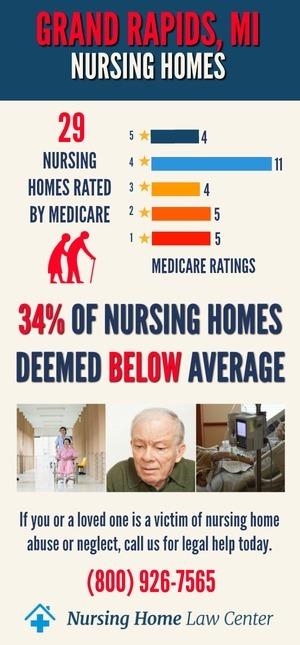The Nursing Home Law Center is committed to providing the legal resources necessary to hold negligent facilities accountable.
Grand Rapids Nursing Home Abuse Lawyer

Licensed in Michigan
Nursing home abuse is a serious concern that affects countless families across Grand Rapids, Michigan, and beyond. As our loved ones age and require more assistance, we trust that the staff members in nursing homes and assisted living facilities will treat them with dignity and respect.
Unfortunately, abuse and neglect happen far too often, leaving vulnerable nursing home residents physically, emotionally, and even financially harmed.
If you suspect that your loved one is a victim of nursing home negligence, it’s essential to seek legal help immediately. Working with an experienced Grand Rapids nursing home attorney can help you hold the negligent nursing home accountable and seek justice on behalf of your family.
Why Hire Nursing Home Law Center
At Nursing Home Law Center, we are dedicated to seeking justice and compensation for those impacted by nursing home abuse. Our skilled legal team has a strong history of managing abuse cases with care and achieving substantial outcomes in settlements and court rulings.
We leave no stone unturned, conducting in-depth investigations to cover all forms of abuse and ensuring that medical costs, emotional distress, and other damages are fully accounted for. With our extensive knowledge of personal injury claims, we efficiently handle the legal process and fight relentlessly to safeguard your rights.
From start to finish, we offer compassionate, clear communication, ensuring you and your family are well-informed, supported, and reassured throughout the journey.
Types of Cases Handled by Our Grand Rapids Nursing Home Abuse Lawyers
Nursing home abuse refers to any intentional or unintentional harm caused to residents of nursing homes or assisted living facilities. Abuse can take many forms, and it’s important to recognize that it doesn’t always involve physical violence.
Our personal injury attorneys handle a wide range of nursing home abuse cases, ensuring that every aspect of mistreatment is addressed.
Physical Abuse
Physical abuse involves inflicting bodily harm on a nursing home resident. This assault can include hitting, pushing, or using excessive force. It may also involve the inappropriate use of restraints, which can cause significant emotional distress and physical injury.
Mental and Emotional Abuse
Mental and emotional abuse can be just as damaging as physical harm. It involves verbal assaults, humiliation, intimidation, and other forms of psychological abuse. This type of abuse often leads to depression, anxiety, and other long-term emotional issues in nursing home residents.
Sexual Abuse
Sexual abuse in nursing homes involves any non-consensual sexual contact with a resident. Vulnerable elderly residents are at particular risk of being taken advantage of, and this type of abuse can leave lasting emotional and psychological scars. Our law firm has experience handling these sensitive cases with the care and attention they require.
Medical Malpractice
Medical malpractice occurs when caregivers fail to provide proper medical treatment. Bedsores, for instance, are often signs of medical malpractice when caregivers fail to turn bedridden residents.
Medication errors or failure to provide necessary medical treatment can lead to severe complications or even death. These are vital signs of potential nursing home neglect or abuse.
Negligence
Nursing home negligence occurs when staff members fail to provide the care and attention that residents need. This neglect can manifest in poor hygiene, malnutrition, dehydration, elopement (wandering away from the facility), and inadequate security measures.
Financial Abuse
Financial abuse involves exploiting or stealing from elderly residents. This exploitation can include unauthorized access to bank accounts, forging signatures, or pressuring residents into changing their wills or other legal documents.
Wrongful Death
In the most tragic cases, nursing home neglect or abuse can lead to the wrongful death of a resident. Family members have the right to seek justice for their loved ones, and our Grand Rapids nursing home abuse lawyers can help file a wrongful death claim to hold the responsible parties accountable.
Understanding Your Legal Rights
Nursing home residents have numerous protections under federal and state law.
The Nursing Home Reform Act of 1987 is a federal law establishing the legal obligation of nursing homes that receive Medicare or Medicaid services to provide quality care free from abuse and neglect.
In Michigan, additional regulations overseen by the Michigan Department of Health and Human Services ensure the safety and well-being of residents in nursing homes and assisted living facilities.
Eligibility to File a Nursing Home Abuse Claim
Residents, their families, or legal guardians can file a claim if they believe their rights have been violated. Whether it’s a case of physical harm, psychological abuse, or financial exploitation, legal action can help bring justice and compensation to those affected.
Liability in Nursing Home Neglect and Abuse Cases
Elder abuse cases are complex and may involve multiple liable parties.
- Nursing Home Facility: If the facility failed to maintain a safe environment, provide adequate staffing or proper training, or had inadequate security measures, it may be held responsible.
- Nursing Home Staff: Caregivers or other staff members directly involved in the abuse can also be held accountable.
- Third-party Contractors: In some cases, third parties, such as maintenance companies, may share liability if their actions contributed to the abuse.
- Medical professionals: Doctors or specialists affiliated with the nursing home could be liable for substandard medical care or failure to diagnose and treat conditions properly.
How Our Grand Rapids Nursing Home Abuse Attorneys Can Help
Our legal team at the Nursing Home Law Center is dedicated to protecting the rights of elderly residents. With years of experience handling personal injury cases, we offer a comprehensive approach to securing justice for victims.
Free Case Evaluation
We offer a free consultation to discuss the details of your case and determine the best legal approach. This evaluation allows you to understand your options without any financial commitment.
Case Investigation
Our team conducts a thorough investigation to gather evidence, interview witnesses, and review medical records to build a strong case.
Filing the Claim
Once we have a solid case, we file a formal claim on behalf of the resident or their family. We ensure all necessary documents and evidence are submitted on time to avoid delays.
Settlement Negotiation
Many personal injury cases are resolved through settlements. Our nursing home attorneys are skilled negotiators who work to secure the maximum compensation for our clients.
Trial Representation
Our nursing home negligence lawyers will take the case to trial if a settlement cannot be reached. We are committed to fighting for justice and holding negligent nursing homes accountable.
Common Signs of Elder Abuse Among Nursing Home Residents
There are 38 Medicare-approved nursing homes in Grand Rapids, Michigan. 11 of these facilities (29%) have an overall rating below or much below average. Specifically, 13 nursing homes (34%) fall short in health inspections, and 13 facilities (34%) have inadequate staffing levels. Four facilities (11%) rated poorly in quality measures. [1]
The worst-rated nursing homes in Grand Rapids include:
- Allendale Nursing and Rehabilitation Community
- Healthbridge Post-Acute Rehabilitation
- Medilodge of Grand Rapids
- Skld Beltline
- Skld Zeeland
Recognizing the signs of nursing home negligence and abuse is critical to stopping it. Some common indicators include:
- Unexplained bruises or injuries
- Sudden weight loss
- Bedsores or infections
- Poor personal hygiene
- Fearfulness or withdrawal from social interaction
- Unexplained financial transactions
What to Do If You Suspect Nursing Home Abuse
If you suspect nursing home negligence, it’s crucial to act quickly to protect your loved one. Follow these steps:
- Call 911 if there is immediate danger.
- Report nursing home abuse and negligence to the facility administrator or management to document your concerns.
- File a complaint with your local Ombudsman’s office. Ombudsmen advocate for nursing home residents and investigate claims of abuse.
- Contact a nursing home abuse lawyer to discuss your legal options.
Damages You Can Recover Through a Nursing Home Abuse Claim
In a nursing home negligence claim, victims and their families can recover various types of damages depending on the circumstances of the case.
Economic damages are measurable financial losses incurred due to abuse or neglect. These can include:
- Medical expenses
- Relocation costs
- Rehabilitation and therapy
- Lost income
Non-economic damages compensate victims for the emotional and psychological toll of the abuse. These can include:
- Pain and suffering
- Loss of enjoyment of life
- Emotional distress
- Loss of consortium
Punitive damages may be awarded in cases where the abuse was especially egregious or involved intentional harm. These damages are designed to punish the responsible parties and deter others from engaging in similar behavior.
The Cost of Hiring a Grand Rapids Nursing Home Abuse Lawyer
At the Nursing Home Law Center, we operate on a contingency fee basis, meaning you won’t pay any fees unless we win your case. This arrangement ensures that every family can afford quality legal representation regardless of their financial situation.
You Have Limited Time to Take Legal Action in Grand Rapids
When filing a nursing home negligence claim, it’s important to take action quickly. In Michigan, a statute of limitations limits the time you have to file a lawsuit. Nursing home abuse lawsuits generally have a three-year statute of limitations, with medical malpractice claims allowing two years. The clock may start when abuse is discovered for ongoing or hidden issues.
Waiting too long could prevent you from recovering compensation, so contact our office today to ensure you meet the deadlines.
Contact a Grand Rapids Nursing Home Abuse Attorney Today!
If you or a loved one has suffered abuse in a Grand Rapids, Michigan, nursing home, our law firm is here to help. With extensive experience handling nursing home neglect cases, we are committed to fighting for residents’ rights and holding negligent facilities accountable. Call us today for a free consultation and take the first step toward securing justice for your family.
Call us at (800) 926-7565 or fill out our contact form.
References: [1] Medicare


